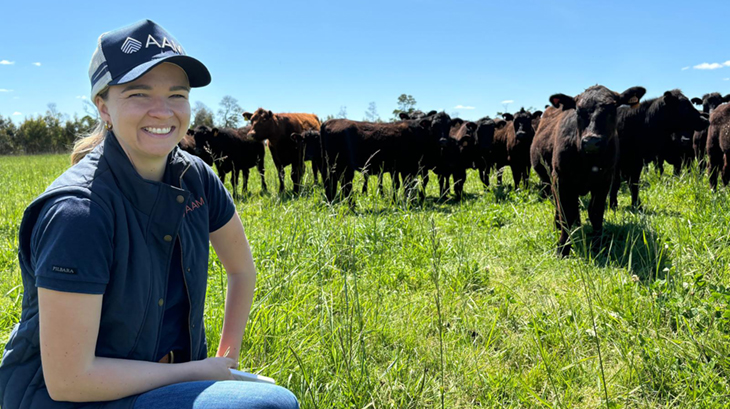Global approaches tabled at sustainable beef conference: Uruguay

Kari Moffat, Sustainability Manager, AAM – in Uruguay. Image: Kari Moffat
Kari Moffat, Sustainability Manager at AAM, an Australian-owned and operated investment management group, represented the Australian Beef Sustainability Framework (ABSF) at the 2024 Global Conference on Sustainable Beef in Uruguay. The conference brought together international industry leaders, policy makers, researchers and supply chain stakeholders dedicated to championing sustainability in the global beef sector.
As a member of the ABSF Steering Group, we spoke with Kari about her key takeaways from the conference and the critical steps she sees for building a more sustainable and accountable global red meat industry.
|
Conference snapshot Organiser: Global Roundtable for Sustainable Beef (GRSB) Theme: Proof positive – Reporting global beef sustainability Focus: Progress toward reducing the global beef industry's environmental impact, improving animal welfare, and enhancing community wellbeing through sustainable practices. |
Q&A with Kari Moffat
What is the GRSB, and why is it important for the Australian beef industry to be involved in these forums?
The Global Roundtable for Sustainable Beef (GRSB) is a multi-stakeholder initiative focused on promoting sustainability across the global beef value chain. Its members include producers, processors, retailers, financial institutions, industry services and researchers from around the world.
Australian organisations are actively involved in the GRSB through its membership and leadership roles, with Cattle Australia and the Australian Beef Sustainability Framework sitting on the GRSB Board of Directors.
Participation in the GRSB allows Australia to engage in global policy discussions, contribute to sustainability initiatives, and benefit from collaborative efforts addressing beef industry challenges worldwide.
What insights did you gain from the conference that could impact the ABSF?
The main challenge all beef producers face – whether here or in Uruguay – is that consumers have yet to demonstrate a willingness to pay higher prices for sustainability credentials apart from quality indicators. While governments globally are pushing for on-farm changes, the recurring question is: who will bear the cost?
Wholesalers and retailers view credentialed products as part of their market differentiation strategies. In some countries, preferential loans and other incentives exist for these businesses, but many are still unwilling to pay a premium for the products themselves and expect producers to carry these increased costs.
This global reality has led the industry to focus on linking sustainability practices with productivity improvements to make them feasible on a larger scale. Credentials alone do not guarantee high prices for beef. Quality remains the key factor in driving price premiums.
We saw this in Uruguay, visiting a ranch that was undertaking regeneration practices, certified carbon neutral, involved in a never-ever program and held animal welfare certification.
Despite these credentials, the producer wasn’t receiving premiums for them. Another producer I visited, who was part of a branded beef program, earned premiums between 5–10% – but only based on meat quality.
As a major global beef exporter, Australia has an opportunity to lead this conversation and show courage in this space. Producers need to be central to these discussions. This transition will come at a cost, and producers currently feel they are shouldering the burden. We need to create equitable market systems where those driving the most change, reap the greatest awards.
How does the ABSF compare to other initiatives globally?
The ABSF has made strong progress in benchmarking the industry and identifying areas needing further attention. However, our investment in these initiatives is smaller compared to other countries, which see sustainability credentials as a way to capture market share in segments where Australia has traditionally been dominant.
For decades, Australia has led the world in lifetime traceability, on-farm quality assurance and food safety. However, this emerging market segment is far more competitive. To maintain our position, we must use the ABSF to guide investment decisions and inform marketing strategies.
What were your key takeaways from the conference?
There is an ongoing conversation regarding deforestation and how it relates to beef production, however, reaching consensus on a definition is a complex issue. The challenge lies in monitoring and improving outcomes while respecting local contexts and maintaining a collaborative approach – particularly with producers, who will bear the brunt of any changes.
What qualifies as deforestation in some regions, may be considered essential land management for eco-system health in others. There is also an equity issue – some countries advocating for strict definitions have benefited from centuries of the same practices they now want to restrict. Navigating these differences is critical, but a pathway forward exists.
The GRSB is helping by hosting webinars on land use definitions and offering capacity building resources. It was inspiring to hear success stories from countries like Canada and Brazil, and to share our own achievements, including Cattle Australia’s work on the Land Management Commitment.
To remain competitive, Australia must continue engaging globally and proactively to showcase the strong practices and regulations we already have in place.
More information
Contact:
Kari Moffat
Jacob Betros
Resources: